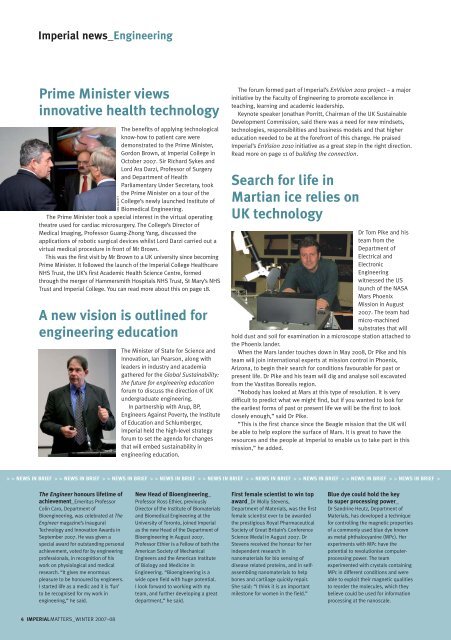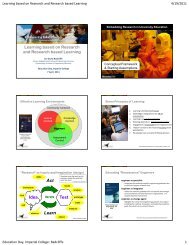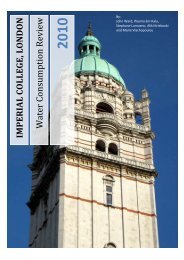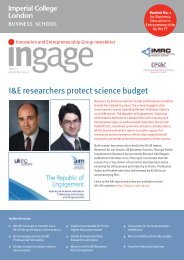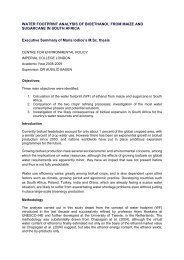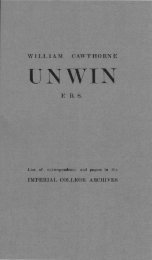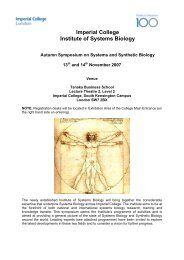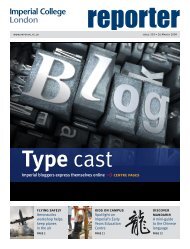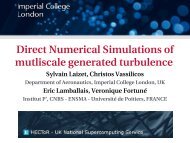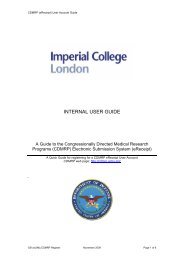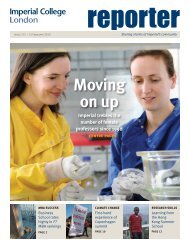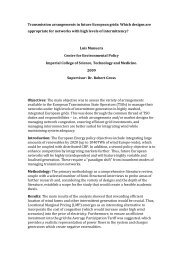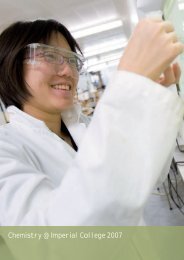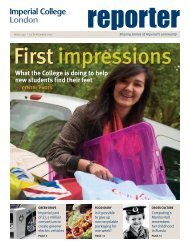online final 31 - Imperial College London
online final 31 - Imperial College London
online final 31 - Imperial College London
Create successful ePaper yourself
Turn your PDF publications into a flip-book with our unique Google optimized e-Paper software.
<strong>Imperial</strong> news_Engineering<br />
Prime Minister views<br />
innovative health technology<br />
The benefits of applying technological<br />
know-how to patient care were<br />
demonstrated to the Prime Minister,<br />
Gordon Brown, at <strong>Imperial</strong> <strong>College</strong> in<br />
October 2007. Sir Richard Sykes and<br />
Lord Ara Darzi, Professor of Surgery<br />
and Department of Health<br />
Parliamentary Under Secretary, took<br />
the Prime Minister on a tour of the<br />
<strong>College</strong>’s newly launched Institute of<br />
Biomedical Engineering.<br />
The Prime Minister took a special interest in the virtual operating<br />
theatre used for cardiac microsurgery. The <strong>College</strong>’s Director of<br />
Medical Imaging, Professor Guang-Zhong Yang, discussed the<br />
applications of robotic surgical devices whilst Lord Darzi carried out a<br />
virtual medical procedure in front of Mr Brown.<br />
This was the first visit by Mr Brown to a UK university since becoming<br />
Prime Minister. It followed the launch of the <strong>Imperial</strong> <strong>College</strong> Healthcare<br />
NHS Trust, the UK’s first Academic Health Science Centre, formed<br />
through the merger of Hammersmith Hospitals NHS Trust, St Mary’s NHS<br />
Trust and <strong>Imperial</strong> <strong>College</strong>. You can read more about this on page 18.<br />
IAN GILLETT<br />
A new vision is outlined for<br />
engineering education<br />
The Minister of State for Science and<br />
Innovation, Ian Pearson, along with<br />
leaders in industry and academia<br />
gathered for the Global Sustainability:<br />
the future for engineering education<br />
forum to discuss the direction of UK<br />
undergraduate engineering.<br />
In partnership with Arup, BP,<br />
Engineers Against Poverty, the Institute<br />
of Education and Schlumberger,<br />
<strong>Imperial</strong> held the high-level strategy<br />
forum to set the agenda for changes<br />
that will embed sustainability in<br />
engineering education.<br />
The forum formed part of <strong>Imperial</strong>’s EnVision 2010 project – a major<br />
initiative by the Faculty of Engineering to promote excellence in<br />
teaching, learning and academic leadership.<br />
Keynote speaker Jonathan Porritt, Chairman of the UK Sustainable<br />
Development Commission, said there was a need for new mindsets,<br />
technologies, responsibilities and business models and that higher<br />
education needed to be at the forefront of this change. He praised<br />
<strong>Imperial</strong>’s EnVision 2010 initiative as a great step in the right direction.<br />
Read more on page 11 of building the connection.<br />
Search for life in<br />
Martian ice relies on<br />
UK technology<br />
Dr Tom Pike and his<br />
team from the<br />
Department of<br />
Electrical and<br />
Electronic<br />
Engineering<br />
witnessed the US<br />
launch of the NASA<br />
Mars Phoenix<br />
Mission in August<br />
2007. The team had<br />
micro-machined<br />
substrates that will<br />
hold dust and soil for examination in a microscope station attached to<br />
the Phoenix lander.<br />
When the Mars lander touches down in May 2008, Dr Pike and his<br />
team will join international experts at mission control in Phoenix,<br />
Arizona, to begin their search for conditions favourable for past or<br />
present life. Dr Pike and his team will dig and analyse soil excavated<br />
from the Vastitas Borealis region.<br />
“Nobody has looked at Mars at this type of resolution. It is very<br />
difficult to predict what we might find, but if you wanted to look for<br />
the earliest forms of past or present life we will be the first to look<br />
closely enough,” said Dr Pike.<br />
“This is the first chance since the Beagle mission that the UK will<br />
be able to help explore the surface of Mars. It is great to have the<br />
resources and the people at <strong>Imperial</strong> to enable us to take part in this<br />
mission,” he added.<br />
> > NEWS IN BRIEF > > NEWS IN BRIEF > > NEWS IN BRIEF > > NEWS IN BRIEF > > NEWS IN BRIEF > > NEWS IN BRIEF > > NEWS IN BRIEF > > NEWS IN BRIEF > > NEWS IN BRIEF ><br />
The Engineer honours lifetime of<br />
achievement_Emeritus Professor<br />
Colin Caro, Department of<br />
Bioengineering, was celebrated at The<br />
Engineer magazine’s inaugural<br />
Technology and Innovation Awards in<br />
September 2007. He was given a<br />
special award for outstanding personal<br />
achievement, voted for by engineering<br />
professionals, in recognition of his<br />
work on physiological and medical<br />
research. “It gives me enormous<br />
pleasure to be honoured by engineers.<br />
I started life as a medic and it is ‘fun’<br />
to be recognised for my work in<br />
engineering,” he said.<br />
New Head of Bioengineering_<br />
Professor Ross Ethier, previously<br />
Director of the Institute of Biomaterials<br />
and Biomedical Engineering at the<br />
University of Toronto, joined <strong>Imperial</strong><br />
as the new Head of the Department of<br />
Bioengineering in August 2007.<br />
Professor Ethier is a Fellow of both the<br />
American Society of Mechanical<br />
Engineers and the American Institute<br />
of Biology and Medicine in<br />
Engineering. “Bioengineering is a<br />
wide open field with huge potential.<br />
I look forward to working with my<br />
team, and further developing a great<br />
department,” he said.<br />
First female scientist to win top<br />
award_Dr Molly Stevens,<br />
Department of Materials, was the first<br />
female scientist ever to be awarded<br />
the prestigious Royal Pharmaceutical<br />
Society of Great Britain’s Conference<br />
Science Medal in August 2007. Dr<br />
Stevens received the honour for her<br />
independent research in<br />
nanomaterials for bio sensing of<br />
disease related proteins, and in selfassembling<br />
nanomaterials to help<br />
bones and cartilage quickly repair.<br />
She said: “I think it is an important<br />
milestone for women in the field.”<br />
Blue dye could hold the key<br />
to super processing power_<br />
Dr Sandrine Heutz, Department of<br />
Materials, has developed a technique<br />
for controlling the magnetic properties<br />
of a commonly used blue dye known<br />
as metal phthalocyanine (MPc). Her<br />
experiments with MPc have the<br />
potential to revolutionise computerprocessing<br />
power. The team<br />
experimented with crystals containing<br />
MPc in different conditions and were<br />
able to exploit their magnetic qualities<br />
to reorder the molecules, which they<br />
believe could be used for information<br />
processing at the nanoscale.<br />
4 IMPERIALMATTERS_WINTER 2007–08


